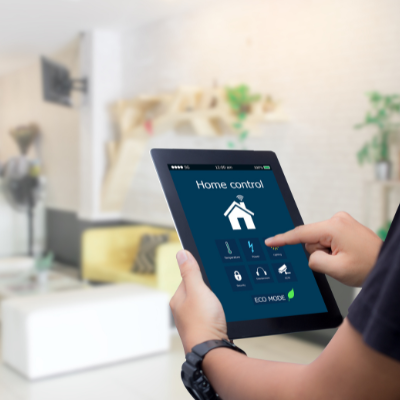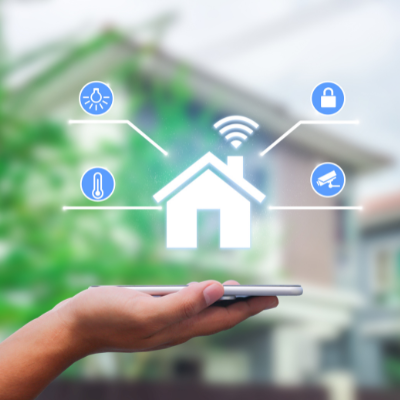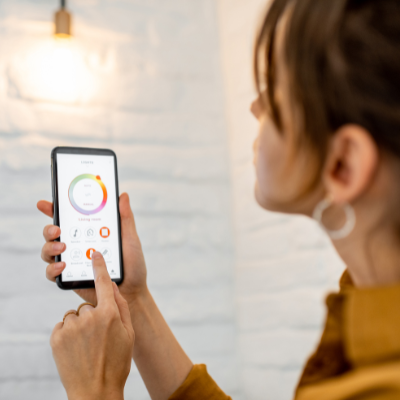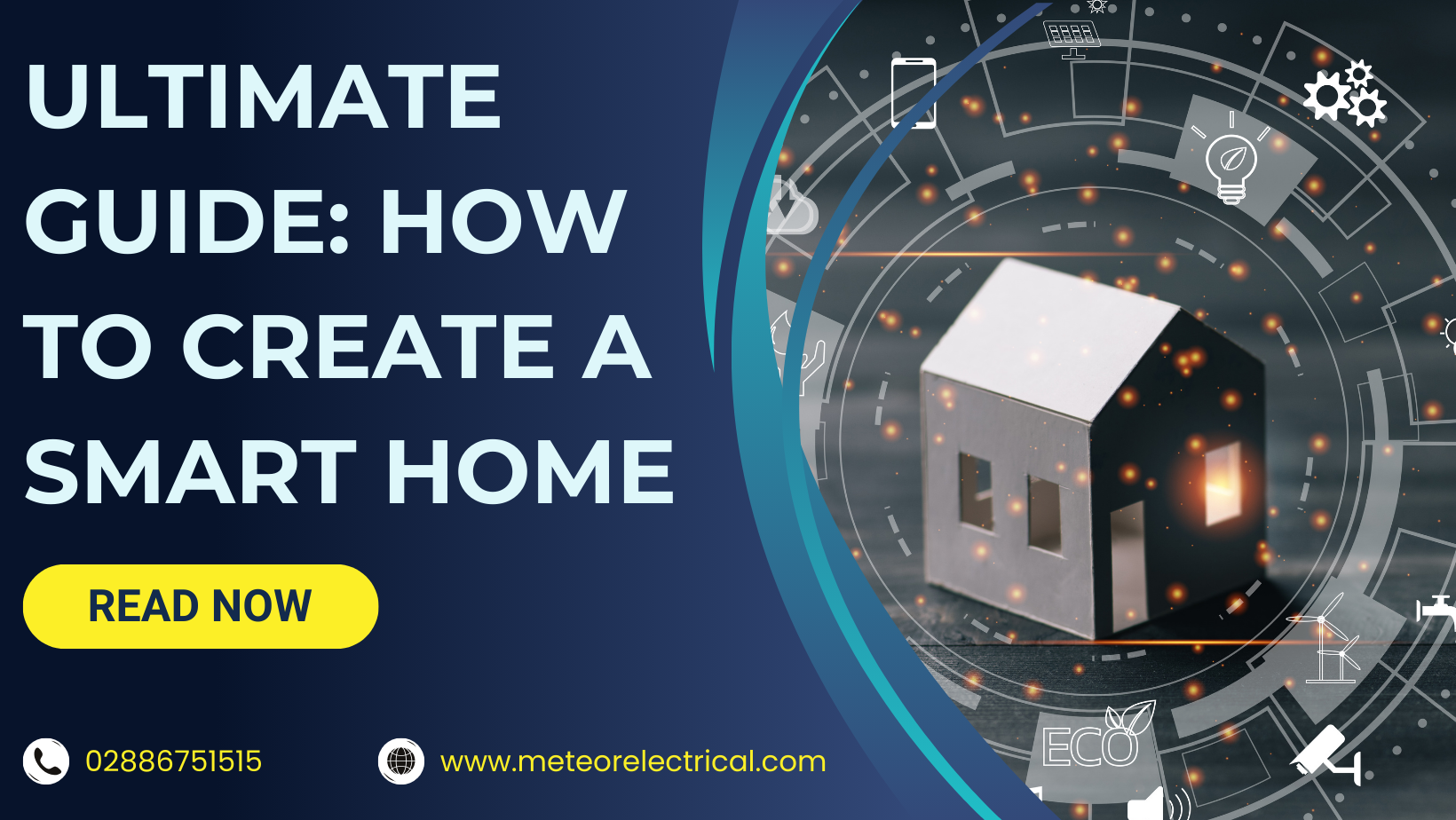Guide on how to create a Smart Home
Many people are making efforts to make their homes smart. Smart home technology is becoming increasingly popular. Smart homes systems allow you to connect your devices to the wifi in order to have better control over them.
Smart homes systems are more than home assistance apps. With smart home technology, you have better control over your electrical appliances, and you can make sure these appliances work efficiently. Smart home technology is also crucial for helping you save energy. Here is everything you need to know about creating a smart home.
What Is A Smart Home?
Before setting up your smart homes systems, it is important to understand the smart home definition as this will help you better understand smart home technology. The smart home market is steadily rising. It is estimated that by 2026 the number of active households with smart home technology will reach 25.4 million.
So what is a smart home definition? A smart home refers to an efficient home setup where electrical appliances are automatically controlled from anywhere using a wi-fi connection. You can use a smartphone or a networked device to control your appliances remotely. Devices and appliances in smart homes systems are interconnected through the internet. This connection allows users to control the functions of the linked devices.
You can grant security access to your home, adjust the lighting or temperature of a room, and you can also create a home theater experience with the help of smart home technology. You can control your smart home technology from a tablet device as well.
Smart homes systems can be set up through either a hardwired system or a wireless connection. With this smart home definition, you can see how your household functions with an internet connection. Since smart homes systems rely less on energy, you save more on your utility bills. Therefore, smart home technology allows you to save energy.

How Do Smart Homes Systems Work And What Do Smart Homes Do?
Now that you know that smart home definition let’s look at how a smart home operates. As mentioned in the smart home definition, all the devices and appliances in a smart homes system can be accessed through one central point. This central point can be a smartphone, laptop, tablet, or even a game console.
For appliances such as televisions, thermostats, door locks, home monitors, lights, and other appliances such as refrigerators, you can use a specialised home automation system. This smart home technology is installed on a smartphone or another networked device. A home automation device provides full control over the appliances. You can create time schedules to control the usability of the devices.
Smart homes that enable lighting control allow homeowners to reduce energy use and benefit from electricity-related savings. Smart home technology has the ability to self-learn skills. This means that the smart home device can learn the homeowner’s preferences and schedules to make adjustments accordingly.
Many homeowners use smart homes systems for security purposes. Some home automation devices come with motion sensor features. This feature notifies the homeowners in the event of motion detection when the homeowners are away. Other home automation devices can notify the authorities, such as the fire or police departments, in case of different dangerous situations.
Once devices such as smart doorbells, smart security systems, and smart appliances are connected together, they become a part of the internet of things technology. The IoT is a network in which physical objects gather and share electronic data. Smart home technology can be either wireless or a hardwired system. Sometimes it can be both.
Wireless smart home systems are easier to install, and it works well with smart climate control, smart lighting, and security. Wireless systems are also cost-friendly and can help you save significantly on installation costs.
Hardwired smart home systems can increase the resale value of any household property. However, hardwired smart home systems are very expensive to install. Hardwires smart home systems are considered more reliable than wireless systems and are difficult to hack into.

Why Should You Have Smart Home?
Now that you better understand the smart home definition, here are some benefits of installing smart home technology.
Save Money And Energy
For many homeowners, the driving force behind installing a smart home system is the potential to save energy and money. Smart heaters and thermostats are a great way of making your home’s heating and cooling systems more efficient.
At Meteor Electrical, you can find several smart heaters with high-grade technology that make your energy consumption more efficient. Apart from smart thermostats, homeowners can also use smart lights, plugs, and other appliances to shut off when not in use. This presents further savings on energy and, ultimately, money. For energy-saving tips, check out our blog here.
Simple And Comfortable Living
Many homeowners want to create a comfortable living space, and technology has made life much easier. Smart homes systems allow ease and simplicity with everyday household appliances. Many smart home devices will enable you to operate with a few simple clicks on an app or through voice control.
However, you can take things further with home automation devices. These devices can be set to triggers based on your location, time of day, or sensors. Due to these comforts, many people are switching to smart lightbulbs as they turn on and off, depending on the time of day. To find the best range of smart lighting, visit Meteor Electrical.
Heightened Safety And Security
Even though conventional alarm systems provide ample security to your home, smart home security provides an even wider range of features that protects your home from multiple emergencies.
While surveilling your home, you can keep away intruders before they do any damage. Smart home security systems contain interlinked locks, lights, cameras, sensors, and doorbells, which enables a higher level of control and surveillance. This type of home security is important if you are away from your home as it allows you to keep surveilling your premises.
Simplify Household Tasks
Another great benefit of smart home technology is how it simplifies simple household tasks. Some homeowners don’t have enough time to dedicate to household chores which is why smart home appliances do the job for them. There are several smart robot vacuums that help you clean up your home. Some stationery appliances such as ovens are also being manufactured with smart features.
Important Energy Insights
If energy efficiency is your main concern, you will benefit from installing a smart home system. Many smart home systems provide helpful insights and data based on your energy consumption. You can browse through this information to find areas for efficiency, or you can cut your energy consumption in these areas to save money on utility bills.
How To Make Your Home Smart?
You must consider the connectivity factor to create a well-working smart home system. To successfully install and implement smart home technology, you must have a good internet connection. Internet of things devices need to connect to the internet to operate, and you can do this in multiple ways.
One of the most popular methods of connecting smart devices includes using WiFi. Many homeowners use a landline and cellular backup for smart security systems and cameras. Less common connections include Bluetooth, ZigBee, and Z-Wave. Here’s a look at all the different ways you can connect your smart home devices.
Wi-Fi
Wi-Fi is a wireless technology that is commonly used to connect smart home devices and appliances. With the help of radiofrequency technology, most smart devices use some type of WiFi to connect your an app. Wi-Fi lets IoT appliances stay connected to the web at extremely high speeds.
However, you should add an extra connectivity system for important devices such as security motion sensors. It is recommended that you use landline backup or cellular backup in case the Wi-Fi stops working or is faulty.
Bluetooth
Bluetooth is another popular method of connecting IoT devices. However, this is less common than Wi-Fi. Many people use Bluetooth to connect wireless headphones. Bluetooth is also used to connect your phone to a smart speaker or a car radio.
Bluetooth uses short-wavelength radio waves to create a connection. Many people use Bluetooth for car stereo systems, mouses, keyboards, gaming consoles, and printers. It is not recommended that you use Bluetooth for home security systems.
Z-Wave And Zigbee
Z-Wave is a wireless communication protocol that allows devices to connect with each through low-energy radio waves. Z-wave also hosts app connections. On the other hand, Zigbee is a communication protocol that creates a network through digital radios.
Zigbee is cheaper than Bluetooth and Wifi, and it uses less power. Since Zigbee only transfers data over a short range, it might not reach most geographical locations. However, people concerned with internet privacy and security will prefer Zigbee as it has one of the most encrypted and secured networks available.
Landline Backup
Landline backup provides a major advantage to smart security systems. If you still use a landline in your home, you can transfer your smart home systems to a landline backup to keep operating during a power outage.
In this type of connection, your smart systems are connected to the communication cables and wires. In case of an emergency, your security system can instantly send your location to the police through the landline backup.
Cellular Backup
Most phones use a cellular backup, and so can your smart home systems. Cellular backup is another great way to keep your smart systems running in the event of a power outage. Cellular backups usually cost a yearly or monthly fee; however, some alarm panels or smart home base station has a built-in cellular communicator.
Which Smart Homes Appliances Should You Use?
There are several important devices and appliances that will help you create a smart home. Since there is such a wide variety, it is difficult to know where to begin. Here are all the important smart home devices you should consider to run your home more efficiently.
Choose A Smart Home Ecosystem
A smart home ecosystem is important as it lets you automate multiple household tasks. There are several home ecosystem devices on the market; however, there are three popular systems. These are Amazon Alexa, Apple HomeKit, and Google Nest.
If the people in your household use iPhones, iPads, and Macs, you should choose an Apple HomeKit. But, if you prefer Android devices, you will benefit from Google Assistant. These ecosystems act as smart assistants that do tasks through voice control.

Smart Light Bulbs
Smart light bulbs are a great way to control the lighting in your home. You can control smart bulbs from your phone, and you can change the colour shade or brightness level as well to create an ideal atmosphere in your home. You can also create a timed schedule for your lights. This schedule will dictate when your lights should turn on or off automatically.
Smart light bulbs are just as easy to install as regular light bulbs; therefore, you can easily replace them with smart lamps. Some smart bulbs might require wiring work. Consult a qualified electrician before preceding.
To find the best smart light bulbs visit Meteor Electrical. The Aurora smart light bulb range at Meteor Electrical provides high-grade lighting solutions than can be controlled from your smartphone.
Our range of LED lights bulbs are also a great way of reducing energy! Check out out blog on Energy Saving Light Bulbs and on a guide on choosing the best energy saving light bulbs here.

How To Link Smart Lights To Google Home?
Here is how you can connect your smart light to Google Home.
- Make sure that your preferred light bulb brand is compatible with Google Home. Check the packaging for any indication regarding compatibility.
- Some smart light bulb manufacturers want you to follow specific instructions. Check any instructional material that comes along with your product before installation.
- Install and turn on your smart bulb. Make sure to put the light bulb in the same room as the Google Assistant hub.
- Open the Google Home app.
- You will see a plus symbol at the top left of the app. Click on the symbol and then set up the device. Select the “works with Google” tab for compatibility.
- Next, tap the smart bulb’s logo and follow the steps on the app to complete the setup. Some smart bulb products will ask you to sign in to the bulb manufacturer’s app.
Smart Plugs
Instead of buying dedicated smart plug devices, you can simply purchase a smart plug to transform ordinary appliances such as fans, lamps, and coffee makers into smart appliances. A smart plug allows you to control these ordinary devices from your smartphone.
However, it is important to bear in mind that smart plugs don’t give your appliances extra features that aren’t there. For example, if you plug a lamp with a white bulb into the smart plug, the plug won’t let you change the colour of the light’s shade. But, you can turn the lamp on and off at specific times.
Some smart plugsS use voice control and commands, while some smart plugs give you helpful insights into your energy consumption. You can also purchase specialised smart plugs for the outdoors. These smart plugs have weather-resistant ratings, making them ideal for outdoor living spaces. You can also link your smart plugged light with a smart security system. Check out our blog on Smart Switches and Sockets here.
Learn more about Smart Plugs here.
How To Add Smart Plug To Google Home?
Here’s how you can add smart plugs to Google Home.
- Open the Google Home app on your phone or the Google Home device.
- Your device should show up on the menu. Once you see it, touch and hold the device title.
- At the top right, press the settings button and then select device type.
- Select the device type from the list and then press next.
- Enter a name for your device and press save. You can now use your smart plug with Google Home.
Smart Heaters
Heating is a major energy consumer in many households. It is important to have an efficient heater to comfortably heat up your home and keep the energy costs low. Smart heaters are a great way to save on heat energy while creating a comfortable home environment.
You can control these modern heaters with a smartphone or Bluetooth device for on-demand heating. On-demand heating ensures you don’t waste any heart energy while warming your home. Many smart heaters also have a rapid heat-up time which means you don’t have to keep your heating unit running.
Many smart heaters can automatically adjust the temperature based on the temperatures outdoors. This ensures energy saving in the long run. At Meteor Electrical, you can browse through our iLifestyle heating range. iLifestyle is an award-winning manufacturer of smart heating products, so you are guaranteed a high-quality heating experience. Meteor carries iLifestyle heaters in various wattages depending on your household’s needs. Check out our blog on Smart Heaters here!
Check out our blog on 10 Ways of Saving Heat Energy.
Smart Thermostat
Smart thermostats are a popular choice for smart devices as they control your home's temperature. With a smart thermostat, you can regulate your home’s environment and set timed schedules for heating and cooling efficiency.
Smart thermostats can sense movement and the occupancy of a room. This means that the device will adjust the temperature setting based on your location. You can use this feature when you are awake and asleep.
Some smart thermostats also allow geofencing, which means that they will adjust the settings based on the GPS on your smartphone. Smart thermostats are a great way to save money on heating and cooling expenses compared to conventional thermostats.
Do Smart Homes Use More Electricity?
Not all smart devices are created equally. Some smart homes can use more electricity; however, the energy consumption depends on your device. While most smart appliances are great at reducing your household’s energy over time, there are some smart devices that tend to increase the amount of energy used by a home. These devices take up more energy because:
- They constantly readjust their settings due to sensory and other triggers.
- An unnecessary energy-consuming device is added to a household.
- Running multiple sensors continuously to achieve smart capabilities.
Some smart devices that take up a lot of energy include:
- Smart speakers
- Smart blinds
- Smart security cameras
However, there are specific devices that are created to help you conserve energy. Some smart appliances that help you save energy include:
- Smart lights
- Smart thermostats
- Smart power strips
Ultimately, smart home appliances can provide multiple benefits, including energy savings. Make sure to do proper research before purchasing smart products to turn your ordinary home into a smart home.
Looking for ways to reduce energy saving at home? Check out our blog!

